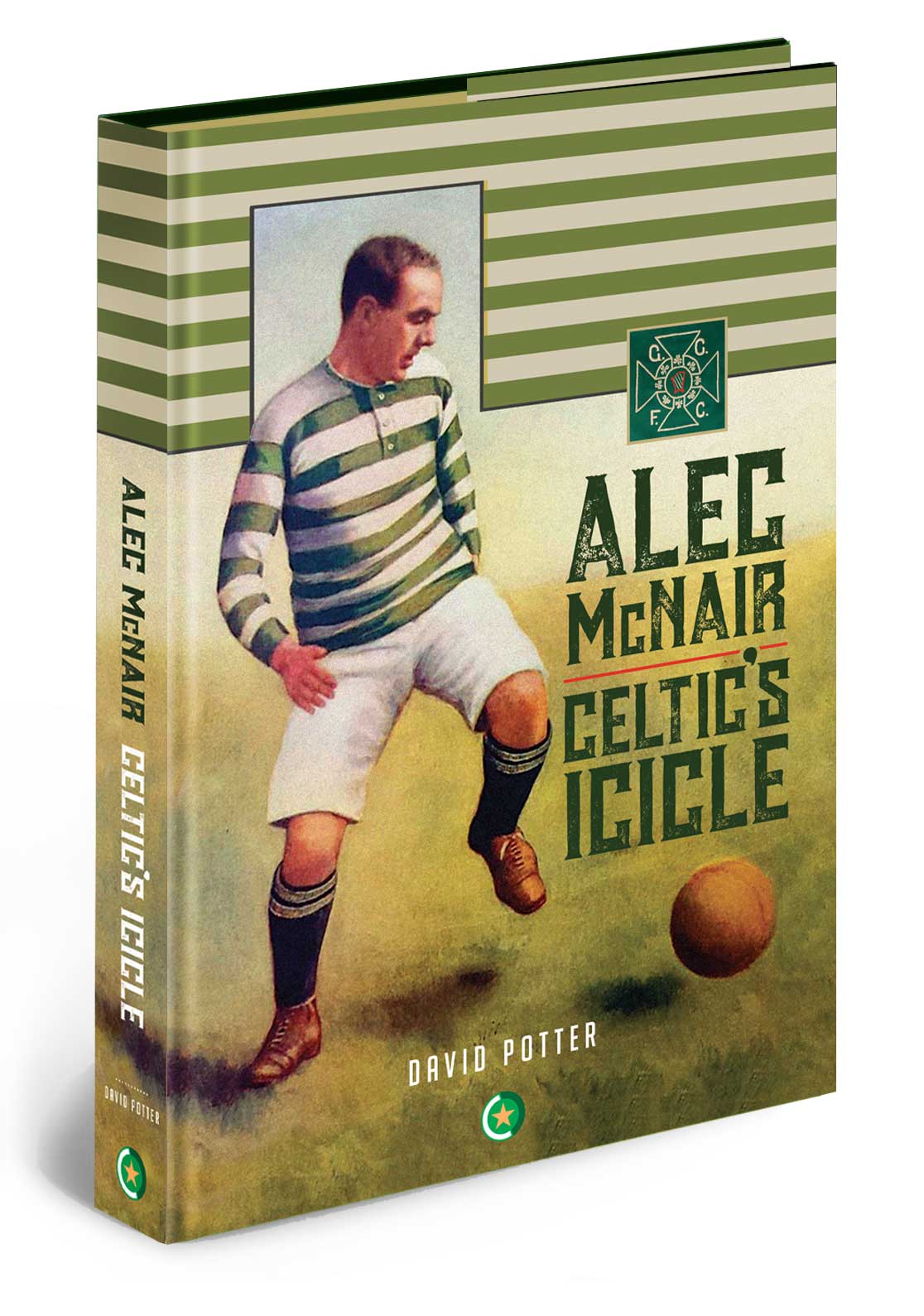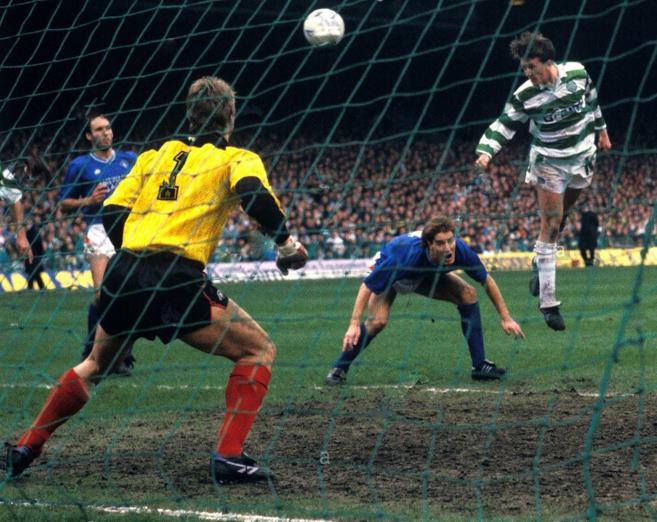This astonishing game at Celtic Park is remembered for the four players sent off, but it is a shame that this is how it is recalled, for there was some good football played as well, and Celtic thoroughly deserved their 2-0 victory to put them into the semi-finals of the Scottish Cup. As for Rangers, the whole world was able to see on their TV screens just exactly what they were like.
Season 1990/91 had not been a great season for Celtic. The loss of the Scottish League Cup final after extra time to Rangers in October had been hard to take, especially as Celtic had been on top for a good part of the game, but then things got a lot worse. November form was poor and December was disastrous with successive losses to Dundee United, Dunfermline and St Johnstone, and then a 2-0 defeat at Ibrox immediately after the New Year meant that there could be no League challenge this year.

Fingers had been pointed at quite a few players and at manager Billy McNeill himself with all sorts of stories being leaked about the lack of dressing room harmony and players being unhappy etc. It was clear that things were far from acceptable, but we all knew that the problem went a lot deeper than that. There had been no attempt to match Rangers in their spending, and the question was rightly asked how it was that a team like Celtic could not match what Rangers were doing. It was difficult to believe that whatever Rangers did, Celtic could not also do.
The answer of course lay in the Board Room where the Directors, while helping themselves to bonuses, seemed unwilling to spend enough money on new players. They were obsessed, for example, about a new stadium when what we all really wanted was a team on the park that was worthy of the name Celtic. As it was, Rangers were being allowed to do more or less what they wanted without any challenge from the other big team in Glasgow. Aberdeen were putting up a fight, but nothing came from Celtic.
As the days began to lengthen in January and February, however, the form of the team began to show a slight improvement. There was no obvious reason for it in terms of personnel, but there was a certain improvement in attitude, and there was still the Scottish Cup to be played for. Defeats of Forfar at Station Park and St Mirren at Celtic Park gave a glimmer of hope, and the pairing with Rangers at Celtic Park meant that this game was now win or bust for the season. A defeat here must surely mean the departure of Billy McNeill and quite a few of his players. It might also mean more radical changes in the club.
The game was moved to the Sunday for TV purposes, and as luck would have it, it was St Patrick’s Day. Possibly the Saint himself was watching “from his mansions above” as the old song (now but rarely heard at Celtic Park, alas!) would have it. If so, he would have been delighted at what he saw. Certainly anyone connected with Celtic was happy, and Scottish neutral opinion had reason to feel that someone at last had stood up to Rangers, and Rangers did not like it!
Graeme Souness, the Manager of Rangers, had upset the authorities several times recently and was obliged to watch the game from the Directors’ Box, where he suffered a fair amount of abuse, even though gentlemanly Celtic Director Jack McGinn more than once gestured to the Celtic fans to desist. Souness, to his credit, would apologise after the game for the behaviour of some of his players. He would not, in any case, stay much longer at Ibrox. Rangers also had Maurice Johnston in their side, and it was hardly surprising that he received pelters from those who once adored him. In the event, his contribution was peripheral.


Attacking the Rangers End, Celtic opened the scoring as early as the sixth minute when Gerry Creaney received a knock down from Tommy Coyne. It had come from a free-kick taken by Dariusz Wdowczyk. Coyne outjumped Richard Gough and Creaney took his goal clinically well. It was no more than Celtic deserved, and half an hour later, they went further ahead, once again from a Wdowczyk free kick. This time Wdowczyk scored himself although he did get the benefit of a wicked deflection. Nevertheless if you have the courage to try a shot, you deserve all the luck that you get.

Thus Celtic went in at half time two goals ahead. The general opinion was that Celtic deserved their lead, even though there was an element of luck about the second goal. It was also agreed that some of the tackles were getting a bit fierce, and that Mr Waddell from Edinburgh, although having a reasonable game so far, would have to work hard to avoid things getting out of hand as Rangers became ever more desperate to avoid a defeat and an exit from the Scottish Cup, a trophy they had not now won for ten years.
It was in the second half that the game really got silly with the red cards dominating the news the following morning rather than the football played. The first red card was for Celtic’s Peter Grant for breaking too early from the wall at a free-kick. This sounds draconian, but in fact Mr Waddell was technically correct, for Grant had just previously been booked (for a foul on Maurice Johnston!) It was still harsh, but Peter’s only fault was over enthusiasm while Mr Waddell might, to advantage, have ignored the trivial offence.
But off went the influential Grant, and now the Rangers supporters began to see a glimmer of hope. It is often said that at 2-0, the next goal is the important one, and in this case, if Rangers could only score once and Celtic were a man short, then Rangers were in with a chance. In the event, no further goals were scored, and it was the next sending off that was crucial.
It was, in fact, Terry Hurlock of Rangers who got the long walk. He had had a few meaty tussles with Tommy Coyne throughout the game, and on this occasion Tommy got the better of him, he lashed out with his elbow. This was about the hour mark in the game. He did not play often for Rangers after that.

Then we had Mark Walters. Much had been made of the racial abuse that he received from opposition fans when he first came to Scotland. It was deplorable, of course, but Walters was not above making capital out of it. However, no-one could class him as any kind of innocent victim after his scything tackle on Tommy Coyne after two less successful attempts to put Tommy in a wheel chair. Mr Waddell was once again on the ball, and Walters joined Hurlock in the showers.
While all this had been going on, Celtic had been playing sensibly, passing the ball about to each other and refusing to rise to the bait. Centre half Paul Elliott had been superb, playing on after a hard smack in the mouth with the ball (not, on this occasion, from a Rangers player!) But there was yet another sending off after aggressive postures and use of arms after a clash between Anton Rogan of Celtic and Mark Hateley of Rangers. Rogan was rightly yellow carded, but as Hateley had already seen yellow, red was the colour this time, and he also departed the scene, blowing kisses to the Celtic crowd!

By this time, any meaningful football had more or less stopped. Celtic, through Creaney, might have scored again, but it did not matter, for Rangers did not have enough players left on the park to inflict any damage.
There was no need for anyone connected with Celtic to condemn Rangers for their misdemeanours, for Rangers’ behaviour spoke for itself. They would be well punished for this, not least in the fact that they yet again missed out on their chance to win the Scottish Cup. In fact, Celtic had now put them out of the competition three years in a row.
For Celtic, however, it was possibly the only highlight in a miserable season. It was Motherwell who were our downfall this year, beating Celtic in a Scottish Cup semi-final replay to the general misery of all in green and white. It was hardly surprising that the ever beloved Billy McNeill had to be handed his cards at the end of the season. A fanzine put it very well when he said that “Billy was too much of a supporter to be a Manager of this great club”.
But the dark, dark anguish of our soul still had several more years to run, and the decade of the 1990s, although in some ways the most interesting decade of our history, was also, the exception of the 1940s, the worst of them all, and this is why games like this 2-0 defeat of Rangers had to be cherished along with the jokes about how at the next Rangers Dance, no-one wanted to dance the Eightsome Reel, for they had already seen eight men reel at Celtic Park.
David Potter
Sunday 17 March 1991 Scottish Cup Quarter Final
Celtic: Bonner; Wdowczyk, Rogan, Grant, Elliiott, Whyte, Miller, McStay, Coyne, Creaney, Collins
Rangers: Woods, Steven, Munro (Cowan), Gough, Nisbett, Hurlock, Steven (Huistra), Ferguson, Hateley, Johnston, Walters
Referee Mr A Waddell, Edinburgh




